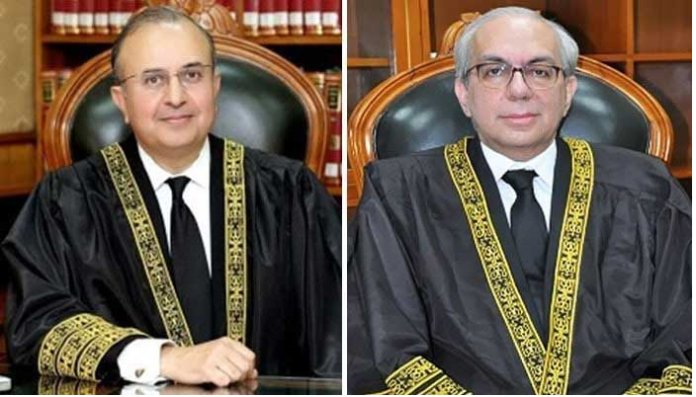ISLAMABAD, AUG 21 (DNA): Supreme Court’s Justice Mansoor Ali Shah and Justice Munib Akhtar have held that the Judicial Commission of Pakistan (JCP) is not the appropriate forum for deliberation regarding the constitution of a full court for hearing petitions challenging the 26th Constitutional Amendment.
Both senior judges clarified their stance through a detailed letter regarding the background of why a full court was not formed on the issue of the 26th Amendment.
“We informally made strenuous efforts that a Full Court meeting be called, either by way of the Court sitting as such on the judicial side or at least convening on the administrative side to hear petitions challenging the 26th Amendment,” read the letter.
The two judges said that at a time when no question was more important for the apex court, the required consensus — which could only be achieved in a manner consistent with the law and the practice of the court by holding a Full Court Meeting — could not emerge.
The result, inter alia, was that the apex court was unable to develop an institutional response. “The process could not be substituted by the CJP informally meeting the judges individually, all the more so when the other members of the Committee (i.e., the undersigned) did not (and were not invited to) participate in this exercise,” the letter stated.
Both the judges maintained that what was required was collective deliberation and decision-making; that, regrettably, did not come about.
They added that at a time when no question was more important for the SC it was necessary to immediately create consensus by calling a Full Court meeting, so that the direly needed institutional response could be given.
“That response could only come from the judges themselves, by their convening in open Court or meeting in full conclave,” they said, adding that the dire consequences of that not happening continue to reverberate in the SC, the whole of the judiciary and indeed the entire constitutional framework.
Furthermore, the two judges said that matters thereafter moved to a more formal phase when the meeting of the Committee was called in accordance with law and the majority in attendance took the decisions reflected in the minutes of 31.10.2024, which was a legally binding decision that could not be disregarded by anyone.
Similarly, they said that when the petitions were not fixed on November 4, 2024, as directed by the Committee, they wrote again, partly in protestation and certainly to ensure compliance, but this letter too was, regrettably, disregarded. “Once again, a binding decision of the Committee was not given effect,” the letter stated, adding that they have carefully examined both the notes of the CJP, which have now been placed in the public domain.
They noted that the entire matter would have been considered by the Full Court had it been timely convened, as required by law.
Referring to the JCP meeting, the two judges said that neither of the two notes penned by the CJP was sent to the other members of the Committee.
Instead, one of the notes was read out by him at the meeting of the JCP on November 5, 2024.
The two judges said that the JCP was not the forum for such a matter, nor could the Committee’s decision of 31.10.2024 be forwarded then, or on 05.11.2024, to the Constitutional Bench or Head or any committee thereof for the simple reason that they did not exist on either of the said dates.
“Nor did they have any authority or jurisdiction over, or could by any act or omission defeat or frustrate, a decision of the Committee taken in accordance with law,” the letter stated.
“We reiterate that on both of the said dates the only legally binding decision in the field was the Committee’s decision of 31.10.2024, which ought to have been given effect in letter and spirit but regrettably, this was never done,” the two judges maintained.
The letter argues that obtaining opinions individually from judges was against legal norms and judicial practice and that such opinions carry no legal weight.
“If at all the Judges were to be consulted, the proper (indeed only) course was to convene a Full Court meeting on the administrative side where judges could deliberate and decide together,” the letter stated.
The two judges said that a rushed and private canvassing of judges’ views had no legal basis or institutional legitimacy. Furthermore, they said that they were not part of these hurried exchanges with the judges and were not aware what they were informed or asked, and in what context.
Justice Shah and Justice Akhtar further said that it was also again pointed out that the placing of the matter before the Full Court on the judicial side would in any case enable the SC, sitting as such, to itself decide whether the challenges to the 26th Amendment were to be so heard or be placed before a Constitutional Bench that would come into being under the 26th Amendment; however, the CJP did not agree.

















